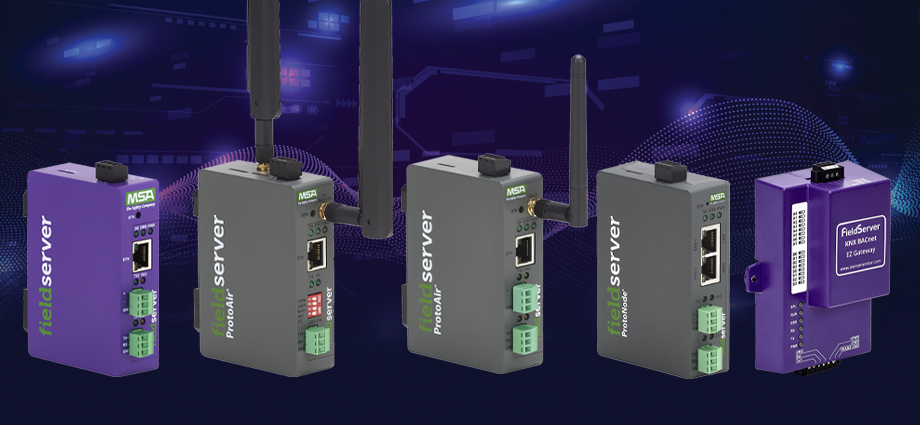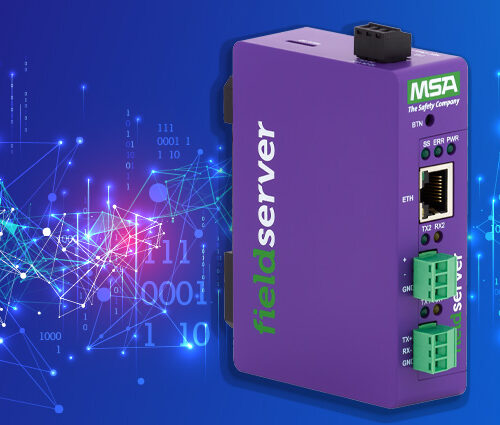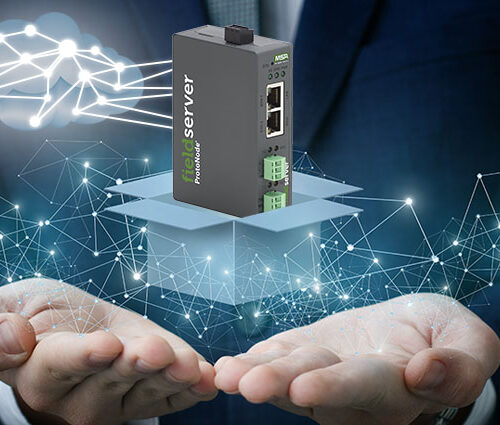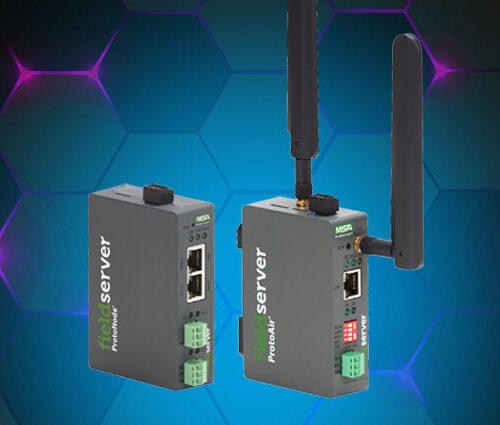
Industrial networks rarely speak a single language: Modbus here, BACnet there, and now MQTT for cloud applications for structured data exchange. The challenge is making them work together without replacing what’s already installed.
It’s the classic integration problem:
- One vendor speaks Modbus RTU.
- The management software platform requires BACnet/IP
- A new stakeholder wants to use OPC UA for secure, real-time data exchange on the factory floor, and MQTT for transmitting data to the cloud.
- And system integrators are expected to make it all work without replacing what’s already installed.
That’s exactly the role of protocol gateways like MSA’s FieldServer. Our gateway solutions are designed to translate, route, and normalize data so system integrators can connect networks, bridge legacy systems, and deliver IoT-ready visibility.
But not every application calls for the same solution. Whether the need is for maximum flexibility, plug-and-play simplicity, cost-effective routing, or enterprise cloud integration, this guide will help system integrators decide which FieldServer product best fits the project.
From Legacy to IoT: Why Gateways Matter More Than Ever
Of course, the connectivity challenge isn’t new, but it is getting more complex. Today’s industrial networks combine decades-old devices with modern automation systems, IT-driven requirements, and IoT expectations. Each project brings more protocols to manage, more stakeholders requesting data-driven insights, and more pressure to deliver enterprise-wide visibility.
Here’s a snapshot of what many of today’s projects demand:
- Cross-vendor compatibility: The ability to bring legacy and new equipment onto the same network within one gateway platform
- Enterprise visibility: The capability of making OT data usable for IT teams and operational leadership
- Enterprise Cybersecurity: Gateway hardware that meets modern cybersecurity requirements, passes third party penetration tests and supports both IT and OT subnet policies
- IoT and analytics readiness: Delivering data to MQTT brokers, OPC UA servers, or cloud platforms
- Advanced diagnostics and support: Built-in tools to quickly resolve network and configuration problems eliminating “finger pointing”
Without the right gateway, integrators risk missing key data, leading to incomplete visibility, reporting gaps, and costly rework. So, how best to overcome these challenges? By selecting a gateway that aligns with both the scope of the project and the organization’s long-term goals.
Gateway Options for Every Integration Scenario
FieldServer offers four main options, each designed for a different type of project.
| Gateway Solution | Best For | Key Advantage |
| QuickServer | Complex, multi-protocol jobs | Supports 140+ protocols, maximum adaptability |
| EZ Gateway | Standard integrations of: Modbus to BACnetM-bus to Modbus to BACnetKNX to BACnet | Pre-loaded profiles for faster, easier setup |
| BACnet Router | BACnet-only routing | Cost-effective MSTP/IP and BACnet Ethernet routing |
| BACnet or Modbus IoT Gateway | IoT/cloud projects | MQTT + OPC UA connectivity plus a new table- and template-based GUI that simplifies configuration, making it easy and intuitive |
Here’s an overview of each gateway and examples of where each may be applied.
QuickServer: When Flexibility Is a Must
QuickServer is the workhorse for complex or unpredictable jobs. With 140+ supported protocols, it’s the most versatile option in the FieldServer portfolio of gateway products.
When to choose it:
- Projects with multiple vendors and device types
- Sites where protocol requirements are unknown until getting on-site
- Long-term contracts where future flexibility matters
Example: An integrator tasked with connecting a hospital’s fire, HVAC, and lighting systems. Each speaks a different protocol. Rather than juggling multiple devices, QuickServer unifies them in one box.
Do’s and Don’ts:
- Do use QuickServer when flexibility outweighs cost.
- Don’t use QuickServer for simple, single-protocol routing since a dedicated gateway is a better fit.
- Do rely on it for projects that may expand over time or require future protocol additions.
- Don’t over-engineer small projects; choose the gateway with the point capacity that fits the scope.
- Do use the dual-Ethernet model when you need to connect multiple devices or systems; it supports up to 10,000 points.
EZ Gateway: When Speed Is Essential
EZ Gateways are designed for standardized integrations. Pre-loaded profiles reduce configuration time and simplify deployment.
When to choose it:
- Projects with standard Modbus-to-BACnet or similar integrations
- Integrations that need to be repeatable across multiple sites
- Teams with limited time or resources for custom configuration
Benefits:
- Quicker deployment with fewer setup steps
- Faster learning curve for technicians
- Reduced risk of configuration errors
Example: A retail chain upgrading HVAC systems across 30 stores. Each site uses the same integration profile. An EZ Gateway lets the integrator deploy quickly and consistently.
BACnet Router: When Simplicity Matters Most
Not every job requires a full gateway. If all that’s needed is a means to route BACnet MSTP to BACnet/IP, the BACnet Router is the simplest, most cost-effective option.
When to choose it:
- Projects limited to BACnet routing, no protocol conversion required
- Cost-sensitive jobs where basic connectivity is all that’s needed
- Teams that want a straightforward install with minimal configuration
Example: A property management group that wants to connect older MSTP devices with a new BACnet/IP BMS. A BACnet Router does exactly what’s needed – nothing more, nothing less.
IoT Gateways: When Cloud Connectivity Is the Priority
As more organizations adopt IoT strategies, system integrators are expected to deliver data beyond the local network. FieldServer IoT Gateways, including the BACnet IoT Gateway and Modbus IoT Gateway, are the answer.
Key capabilities:
- Native MQTT for cloud integration
- OPC UA support for standardized, secure data exchange across systems
- Secure remote connectivity for distributed networks
OEM and integrator flexibility: The Modbus IoT Gateway is available for both OEMs and system integrators, making it equally suited for manufacturers embedding IoT connectivity and integrators modernizing existing systems.
Example: A manufacturing plant wants to push real-time Modbus device data into an analytics platform. Instead of a major controls upgrade, the Modbus IoT Gateway bridges legacy devices to MQTT for cloud-ready visibility.
How to Match the Gateway to the Project
Choosing the right gateway is about much more than specifications. It’s about context. Here’s a practical framework for aligning the best gateway to the application.
Choose QuickServer if … the project involves many protocols or unpredictable requirements.
Choose EZ Gateway if … rapid deployment, repeatability, and ease of use are top priorities.
Choose BACnet Router if … BACnet MSTP/IP or BACnet Ethernet routing is all that’s required.
Choose a BACnet or Modbus IoT Gateway if … the project includes cloud, enterprise, or analytics integration.
Questions to ask:
- Is this project about flexibility or accelerating time to market?
- Does the end user need local connectivity only or IoT/cloud visibility as well?
Conclusion
FieldServer gateways are built with that in mind. From versatile QuickServers to streamlined EZ Gateways, cost-effective BACnet Routers, and IoT-ready MQTT/OPC UA devices, the right gateway can help save you hours of setup, reduce troubleshooting headaches, and deliver much-needed visibility.
Ready to match the right gateway to your next project? Contact a FieldServer expert to get started.






